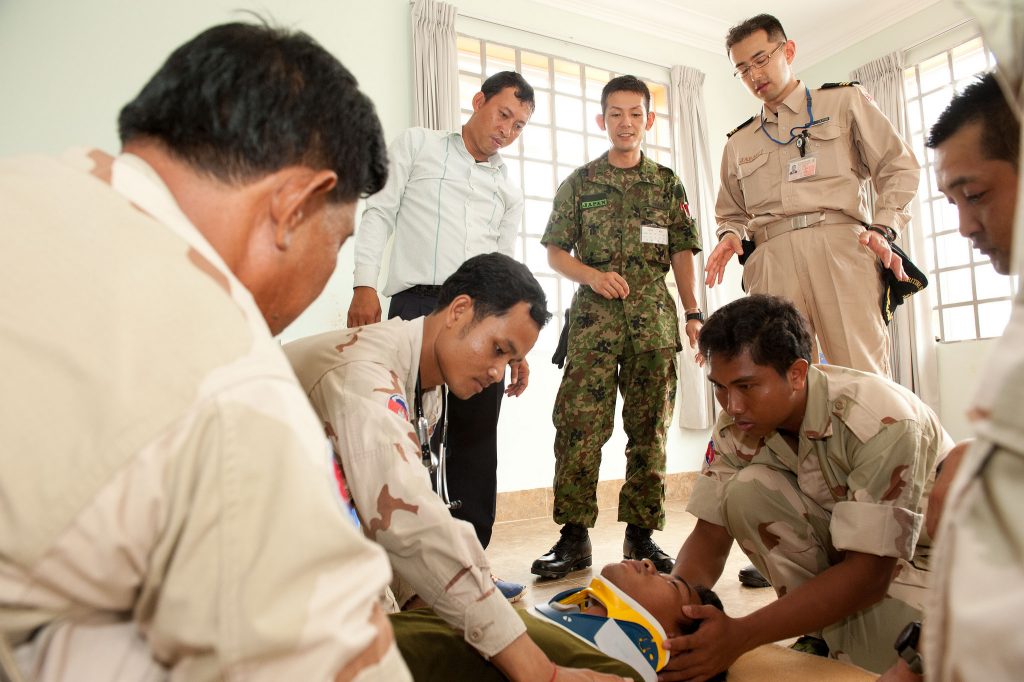
សមាជិកជាយោធាជប៉ុនអង្កេតនាវិកកម្ពុជាបំពាក់ឧបករណ៍ទ្រាប់កដល់អ្នកជម្ងឺក្នុងវគ្គផ្លាស់ប្តូរចំណេះដឹងភាពជាដៃគូប៉ាស៊ីហ្វីកនៅខេត្តព្រះសីហនុ ប្រទេសកម្ពុជា។ រូបភាព ដោយ U.S. Pasific Fleet។ ថតនៅថ្ងៃទី ២១ ខែមិថុនា ឆ្នាំ ២០១៤។ ក្រោមអាជ្ញាបណ្ណ (CC BY-NC 2.0).
តាមរយៈសាខាអភិវឌ្ឍន៍ផ្លូវការរបស់ខ្លួនហៅថា ទីភ្នាក់ងារសហប្រតិបត្តិការណ៍អន្តរជាតិជប៉ុន (JICA) ប្រទេសជប៉ុន ជាម្ចាស់ជំនួយទ្វេភាគីដ៏ធំបំផុតរបស់ប្រទេសកម្ពុជាអស់រយៈពេលជាច្រើនឆ្នាំមកហើយ (ដោយមិនគិតប្រទេសចិន ដោយហេតុថាជំនួយរបស់ចិនតែងតែមិនត្រូវបានផ្តល់ឲ្យតាមរបៀបដូចជំនួយដទៃទៀតទេ)។ ត្រឹមតែក្នុងរយៈពេល ១០ឆ្នាំ ថវិកា ៧២០ លានដុល្លារអាមេរិក (ក្នុងនោះ ១៧០ លានដុល្លារអាមេរិក ផ្តល់តាមរយៈអង្គការអន្តរជាតិ និង៥៥០ លានដុល្លារអាមេរិកតាមរយៈជំនួយទ្វេភាគី)1 បានផ្តល់ដើម្បីគាំទ្រដល់ការអភិវឌ្ឍរបស់ប្រទេសកម្ពុជា ព្រមទាំងការរីកចម្រើន និងការចូលរួមនៅក្នុងអាស៊ានតាមរយៈក្របខណ្ឌដែលបានដាក់ចេញដោយគណៈកម្មាធិការជំនួយអភិវឌ្ឍ។ កាលពីរយៈពេលប៉ុន្មានឆ្នាំមុន ទីភ្នាក់ងារ JICA បានពង្រីក ជំនួយអភិវឌ្ឍន៍ផ្លូវការ (ODA) មកកាន់កម្ពុជា។2 សកម្មភាពនេះត្រូវបានអនុវត្តន៍ដើម្បីជួយដល់សមាហរណកម្មអាស៊ាន និងដើម្បីបង្រួមគម្លាតការអភិវឌ្ឍនៅក្នុងបណ្តាប្រទេសអាស៊ាន។ ទីភ្នាក់ងារ JICA គាំទ្រជាអាទិភាពដល់ការអភិវឌ្ឍរបស់កម្ពុជាតាមរយៈជំនួយឥតសំណង និងកិច្ចសហប្រតិបត្តិការបច្ចេកទេស។3
ការគ្រប់គ្រង និងក្របខណ្ឌជំនួយអភិវឌ្ឍន៍
ទស្សនវិទ្យាមូលដ្ឋាននៃការអភិវឌ្ឍរបស់ជប៉ុន គឺ “វិនិយោគសម្រាប់ពេលអនាគត”។4 ដូចនេះហើយ វាគឺជាគោលដៅអាទិភាពរបស់ជប៉ុន ដើម្បីពង្រឹងសេដ្ឋកិច្ចកម្ពុជាតាមរយៈកំណើនប្រកបដោយចីរភាព និងយុទ្ធសាស្ត្រ។ ដើម្បីសម្រេចបាននូវគោលដៅទាំងនោះ ទីភ្នាក់ងារ JICA បានផ្តល់មូលនិធិយ៉ាងទៀងទាត់ដល់គម្រោងនានាក្នុងវិស័យហេដ្ឋារចនាសម្ព័ន្ធ និងគមនាគមន៍។ គម្រោងដែលកំពុងបន្តជាច្រើនរបស់ជប៉ុន គឺត្រូវបានដាក់ចេញដើម្បីបញ្ជូលជំនួយឥតសំណងរួមជាមួយនឹងជំនួយបច្ចេកទេស។
ជាឧទាហរណ៍ ផ្នែកជាច្រើននៃគម្រោងអភិវឌ្ឍន៍ទីក្រុងរួមបញ្ចូលទាំងការកែលម្អឡើងវិញនូវប្រព័ន្ធរថយន្តក្រុងសាធារណៈ5 ការសាងសង់ប្រព័ន្ធរថភ្លើងស្វ័យប្រវត្តធុនស្រាល និងការធ្វើឱ្យប្រសើរឡើងវិញនូវប្រព័ន្ធលូដើម្បីរំដោះទឹកជំនន់ក្នុងរាជធានីភ្នំពេញ។6 គម្រោងទាំងនេះ ត្រូវបានរចនាឡើងដើម្បីដាក់បញ្ជូលជំនួយរបស់ជប៉ុន ប៉ុន្តែត្រូវបានអនុវត្តន៍ជាគម្រោងកសាងសមត្ថភាព និងការបណ្តុះបណ្តាល ដែលនឹងផ្តល់ការងារ និងធ្វើឱ្យការងារនៅភ្នំពេញកាន់តែងាយស្រួល។7
វិស័យដែលទទួលបានការគាំទ្រខ្លាំងត្រូវបានជ្រើសរើស ដោយសារតែលទ្ធផលដែលទទួលបាន គឺភាពស៊ីចង្វាក់ជាមួយនឹងម៉ូដែលកំណើនប្រកបដោយចីរភាពរបស់ជប៉ុន។ ប្រទេសជប៉ុន ស្ទើរតែផ្តោតទាំងស្រុងទៅលើកំណើនសេដ្ឋកិច្ច ហេតុដូននេះហើយជប៉ុនមានបំណងដើម្បីជួយកម្ពុជារក្សាអត្រាកំណើន ៧ ភាគរយជារៀងរាល់ឆ្នាំ ជាមួយនឹងអតិផរណាដែលអាចគ្រប់គ្រងបាន និងអន្តរកម្មស្ថេរភាពជាមួយនឹងទីផ្សារអន្តរជាតិ។8 រហូតមកដល់ពេលនេះ សេដ្ឋកិច្ចកម្ពុជាបានឆ្លើយតបយ៉ាងប្រសើរចំពោះគម្រោងរបស់ ទីភ្នាក់ JICA – យោងតាមប្រសាសន៍របស់លោកនាយករដ្ឋមន្ត្រី ហ៊ុន សែន កាលពីថ្ងៃទី ២៨ ខែមិថុនា ឆ្នាំ២០១៦ សេដ្ឋកិច្ច កម្ពុជាបានកើនដល់ ៧.១ ភាគរយ ហើយអត្រាអតិផរណាបានស្ថិតនៅក្រោម ១.៩ ភាគរយ។9
ហេតុផលមួយទៀតដែល ទីភ្នាក់ងារ JICA បានជួយដល់វិស័យហេដ្ឋារចនាសម្ព័ន្ធ និងទូរគមនាគមន៍ គឺដោយសារតែជប៉ុន គឺជាប្រទេសមួយក្នុងចំណោមដៃគូពាក់ព័ន្ធធំបំផុតនៅក្នុងអាស៊ាន ហើយបាននិងកំពុងបន្តធ្វើការគាំទ្រប្រទេសកំពុងអភិវឌ្ឍន៍នានានៅក្នុងអាស៊ាន ឈានជើងចូលសេដ្ឋកិច្ចសកល និងតំបន់។10
ជាចុងក្រោយ ដើម្បីសម្រេចបាននូវគោលដៅអភិវឌ្ឍន៍ទាំងនេះ ជប៉ុនក៏បានផ្តល់មូលនិធិដល់កំណើនវិស័យឯកជន និងជម្រុញការអភិវឌ្ឍជនបទផងដែរ។ គោលដៅអភិវឌ្ឍន៍បន្តបន្ទាប់របស់ជប៉ុន គឺការលើកកម្ពស់ការអភិវឌ្ឍសង្គម និងការពង្រឹងអភិបាលកិច្ចរបស់កម្ពុជា។11
ជំនួយដែលផ្តល់ដោយទីភ្នាក់ងារ JICA នាពេលថ្មីៗនេះ ដែលគូសបញ្ជាក់អំពីការអភិវឌ្ឍខាងលើ ត្រូវបានចុះហត្ថលេខាកាលពីក្នុងឆមាសទី១ និងទី២ឆ្នាំនេះ។ នៅក្នុងខែមីនា ឆ្នាំ២០១៦ ទីភ្នាក់ងារ JICA បានផ្តល់ហិរញ្ញប្បទានឥតសំណងចំនួន ២១៥.៥ លានដុល្លារអាមេរិក និងឥណទានសម្បទានសម្រាប់ “គម្រោងជួសជុលស្ពានជ្រោយចង្វារ”, “គម្រោងសម្រាប់ការកែលម្អបរិក្ខារបម្រើឲ្យសកម្មភាពដោះមីន (ដំណាក់កាលទី៧)” និង “គម្រោងកែលម្អផ្លូវជាតិលេខប្រាំ (កំណាត់ផ្លូវព្រែកក្តាម-ធ្លាម្អម) ដំណាក់កាលទី ២”។12 នៅក្នុងខែមិថុនា ឆ្នាំ ២០១៦ កិច្ចព្រមព្រៀងមួយត្រូវបានចុះហត្ថលេខាសម្រាប់អនុវត្តគម្រោងកែលម្អ បច្ចេកទេសផលិតពូជវារីវប្បកម្មសមុទ្រ។ គម្រោងនេះ គឺផ្តោតសំខាន់លើការអភិវឌ្ឍសមត្ថភាព នៅមជ្ឈមណ្ឌលស្រាវជ្រាវ និងអភិវឌ្ឍន៍វារីវប្បកម្មសមុទ្រ ក្នុងខេត្តព្រះសីហនុ ដែលបរិក្ខារសាងសង់ក្រោមជំនួយរបស់ជប៉ុននៅក្នុងឆ្នាំ ២០១២។
គម្រោងផ្សេងទៀតដែលមានជាធរមាន
- គម្រោងសាងសង់ស្ពានអ្នកលឿង
- គម្រោងអភិវឌ្ឍន៍ធនធានអប់រំវិទ្យាសាស្ត្រ និងគណិតវិទ្យានៅកម្រិតមធ្យមសិក្សា
- គម្រោងធ្វើឱ្យប្រសើរឡើងវិញនូវការគាំពារមាតា និងទារកតាមរយៈការអភិវឌ្ឍសមត្ថភាពឆ្មប
- ខួបទី៥០នៃអ្នកស្ម័គ្រចិត្តរបស់ជប៉ុន
- គម្រោងកែលម្អប្រព័ន្ធប្រឡាយ-លូនៅរាជធានីភ្នំពេញ ដើម្បីការពារទីក្រុងពីទឹកជំនន់
- គម្រោងលើកកម្ពស់ការបង្កបង្កើនផលកសិកម្មនៅខាងលិចបឹងទន្លឹសាប
- គម្រោងទីក្រុងអេកូ៧
ធ្វើបច្ចុប្បន្នភាពចុងក្រោយ៖ ថ្ងៃទី ៤ ខែ កក្កដា ឆ្នាំ ២០១៦
ទាក់ទងនឹងជំនួយពីប្រទេសជប៉ុន
- គ្រាប់មីន យុទ្ធភ័ណ្ឌមិនទាន់ផ្ទុះ និងការដោះមីន
- ហេដ្ឋារចនាសម្ព័ន្ធ
- សេដ្ឋកិច្ច និងពាណិជ្ជកម្ម
- ទំនាក់ទំនងអន្តរជាតិ
ឯកសារយោង
- 1. រដ្ឋាភិបាលជប៉ុន. “គោលនយោបាយជំនួយរបស់ជប៉ុនសម្រាប់កម្ពុជា”. ចូលអានថ្ងៃទី ៤ ខែ កក្កដា ឆ្នាំ ២០១៦។ http://www.kh.emb-japan.go.jp/economic/cooperation/japc/japc.htm
- 2. ទីភ្នាក់ងារសហប្រតិបត្តិការអន្តរជាតិជប៉ុន (JICA). http://www.jica.go.jp/cambodia/english/
- 3. រដ្ឋាភិបាលជប៉ុន. “គោលនយោបាយជំនួយរបស់ជប៉ុនសម្រាប់កម្ពុជា”. ចូលអានថ្ងៃទី ៤ ខែ កក្កដា ឆ្នាំ ២០១៦។ http://www.kh.emb-japan.go.jp/economic/cooperation/japc/japc.htm
- 4. កិច្ចសហប្រតិបត្តិការអន្តរជាតិរបស់ជប៉ុន. “ជំនួយអភិវឌ្ឍផ្លូវការរបស់ជប៉ុន ទំព័រស ២០១៤.” ទំព័រ.២១៥។ http://www.mofa.go.jp/files/000118826.pdf
- 5. កិច្ចសហប្រតិបត្តិការអន្តរជាតិរបស់ជប៉ុន. “ជំនួយអភិវឌ្ឍផ្លូវការរបស់ជប៉ុន ទំព័រស ២០១៤.” ទំព័រ.៦៣។ http://www.mofa.go.jp/files/000118826.pdf
- 6. ប៊ុន សេងគង់ និង Igor Kossov. “ទឹកជំនន់បង្កគ្រោះថ្នាក់បំផុតនៅរាជធានី”. កាសែតភ្នំពេញប៉ុស្តិ៍, ចុះថ្ងៃទី ២ ខែ ឧសភា ឆ្នាំ ២០១៦។ http://www.phnompenhpost.com/national/capitals-top-hazard-flooding
- 7. ដូចឯកសារយោងខាងដើម។
- 8. ក្រុមប្រឹក្សាអភិវឌ្ឍន៍កម្ពុជា (CDC). កម្មវិធីម្ចាស់ជំនួយអភិវឌ្ឍន៍. “ការអភិវឌ្ឍន៍អាទិភាពនៃព្រះរាជាណាចក្រកម្ពុជា.” http://www.cdc-crdb.gov.kh/cdc/Donor_Development_Cooperation_Programs/Japan/12th_policy_dialogue_on_oda/downloads/2_1_RGC_Development_Priorities_revised.pdf
- 9. Post staff. “លោក ហ៊ុន សែន មើលឃើញពីសញ្ញាណនៃសេដ្ឋកិច្ចដ៏រឹងមាំ.” កាសែតភ្នំពេញប៉ុស្តិ៍, ចុះថ្ងៃទី ២៨ ខែ មិថុនា ឆ្នាំ២០១៦។ http://www.phnompenhpost.com/business/hun-sen-sees-signs-strong-economy
- 10. កិច្ចសហប្រតិបត្តិការអន្តរជាតិរបស់ជប៉ុន. “ជំនួយអភិវឌ្ឍផ្លូវការរបស់ជប៉ុន ទំព័រស ២០១៤.” ទំព័រ.២១៧។ http://www.mofa.go.jp/files/000118826.pdf
- 11. ស្ថានទូតជប៉ុនប្រចាំនៅកម្ពុជា. ជំនួយសម្រាប់ប្រទេសកម្ពុជា. “ODA តាមគម្រោង៖ គោលនយោបាយជំនួយជាតិសម្រាប់កម្ពុជា.” http://www.kh.emb-japan.go.jp/economic/cooperation/Assistance%20Policy.pdf
- 12. ទីភ្នាក់ងារសហប្រតិបត្តិការអន្តរជាតិជប៉ុន (JICA). “សេចក្តីប្រកាសព័ត៌មាន៖ ការចុះហត្ថលេខាលើកិច្ចព្រមព្រៀងជំនួយឥតសំណង និងកម្ចីរវាងទីភ្នាក់ងារ JICA ប្រចាំនៅកម្ពុជា និងក្រសួងសេដ្ឋកិច្ច និងហិរញ្ញវត្ថុ.” ថ្ងៃទី៣១ ខែមីនា ឆ្នាំ ២០១៦។ http://www.jica.go.jp/cambodia/english/office/topics/press160331.html

